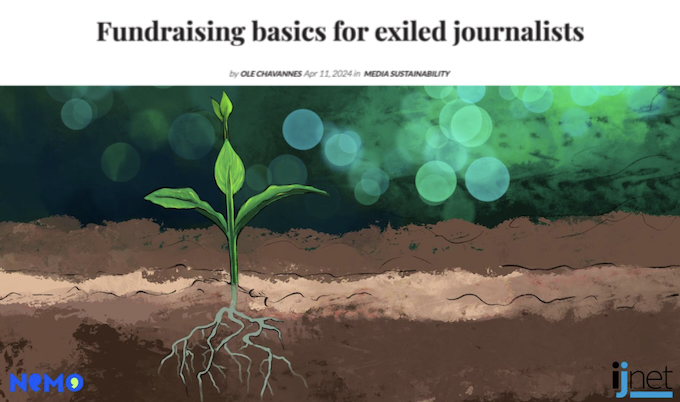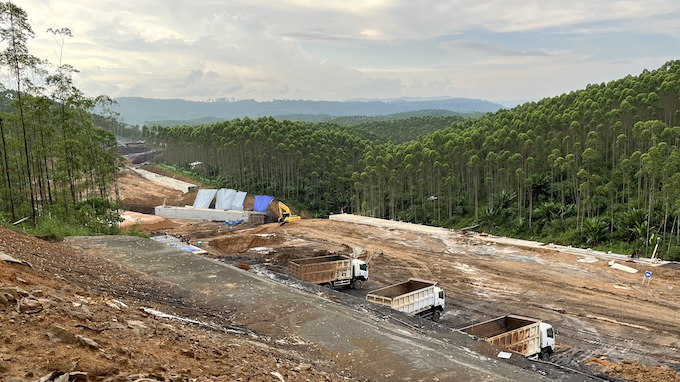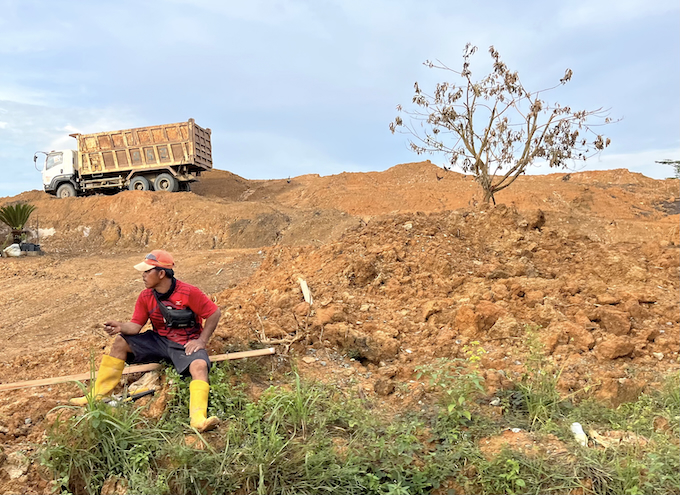Which VPN's work best for Exiled Journalists?

Which VPN's (Virtual Private Network) work best for journalists in exile? My first podcast interview in English > exiled.media/ep 7
by Ole Chavannes, 01 mei 2024
Insider tips & tricks by Alex, who works with Meduza -the leading independent Russian news platform. This podcast is part of a series published by NEMO, the Network for Exiled Media Outlets. Have a listen -20 minutes - and share if you like it. More info @ exiled.media.

Brief overview on the International Journalists' Network (IJNet), as part of the NEMO Exiled Media Toolkit > IJNET.org/fundingbasics
by Ole Chavannes, 15 april 2024
Concrete and practical strategies on how to raise support to fund exiled media operations. This is part of a new series supported by ICFJ (International Center for Journalist): 'Exiled Media 101'.

Nusantara, the new capital of Indonesia opens on 17 August 2024, independence day, if everything works out as planned. The plan is to complete it by 2045 - exactly 1 century after the birth of the republic, after 3,5 centuries of Dutch colonial repression. I visited the largest construction site of the nation in East Kalimantan last summer and saw countless trucks slipping and sliding through bright orange mud.
by Ole Chavannes, 15 februari 2024
It's a 4 hour drive between Balikpapan airport and the white spot on the map, soon to be the new capital of Indonesia. When we arrive it is pitch dark. In an empty restaurant only fried chicken Java-style is on the menu. The next morning I wake up by loud noises; a mix of hyperactive birds and low humming sounds. Outside I see a couple of humming bulldozers pushing mud around. At first I'm amazed by the soundtrack of machines and natural music, but the bird twittering turns out to come out of a speaker, hanged next to a rice warehouse; a loop to keep real birds away.
Incorrect clichés
Let me debunk the two most common false assumptions about this new capital. No, Nusantara is not going to replace Jakarta, because that is sinking, as so many media state. The former Batavia, founded by the Dutch in 1619, was already low land - alike the Netherlands. Now the plan is to invest more in protecting Jakarta against the water ($40 billion), than to build the new capital ($35 billion). Jakarta has become a modern metropole, 32 million people in Greater Jakarta call home and it will aim to maintain. For sure the flooding is a complex problem to tackle, but it is another problem, Nusantara is not going to solve.
Jakartans are even not supposed to move all to one of the least populated islands. Nusantara will only be the new administrative capital, hosting 2 million people by 2045, mainly government officers. It is located exactly in the centre of the archipelago of 17,508 islands for a reason; Nusantara stands for sharing power and wealth more evenly among all 280 million Indonesians (https://en.wikipedia.org/wiki/Indonesia), not only Java. Regionally, it’s not far from Kuala Lumpur, Singapore, Bandar Seri Begawan (Brunei) and Manila. Also, it's about the only Indonesian island without active volcanos, earthquakes and tsunami alerts.

No, they don’t cut away unique primary rain forest with orang utangs and horn bills for the ‘Ibu Kota Nusantara’ (translates as ‘mother city of the archipelago’). The area has been a tree plantage for years already with highly flammable eucalyptus trees, harvested every 8 years. One of the ambitious plans for this 100 thousand hectare ‘green capital’ is to replant 15 million trees; 'Original endemic species, to restore the balance of nature' (source: https://en.antaranews.com/news/270213/some-15-million-trees-to-be-planted-in-nusantara-capital-forest).
Resource exhaustion
Of course constructing such a big city in the middle of Borneo is causing wide ecological damage, no matter how green it will eventually be. Despite the beautiful plans for a CO2 neutral and walkable capital, with cool shades under endemic tree leaves, this many people will exhaust natural resources in a large area, demanding water, electricity and roads. Many indigenous people, often referred to as Dayak and Punan complain about loss of natural diversity, poisonous water and insufficient compensation for confiscated land if any. Often these communities can’t proof with some stamped piece of paper, this forest is their home, providing them and their ancestors already for centuries with food, medicine and shelter.
The reason why the ‘green mother capital’ will arise from the forests anyhow, is because of the president-elect last February: Prabowo Subianto (1951) is the current minister of Defence, wealthy businessman and retired honorary army general, who will be inaugurated in October. In 1998 he was discharged from the military and banned from entering the United States until 2020 for allegedly committing human rights abuses under former dictator Suharto.
A local journalist in Balikpapan tells me Prabowo owns most of the land in East Kalimantan already for a long time. The other two presidential candidates were critical about the pricy new capital, but Prabowo has direct interests. This president will do anything to reign from his new green palace. In this video (pitch 1.0) a glimpse of the glass building, shaped as a giant Garuda, Indonesia's national mythical bird >
I only had the opportunity to research the area for a couple of days, but I can’t wait to go back and dig much deeper in this fascinating endeavour. If I succeed, I’ll let you know first on this blog.
